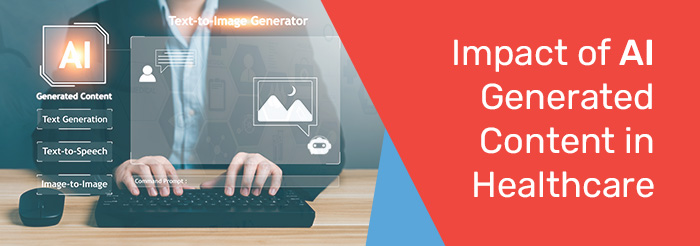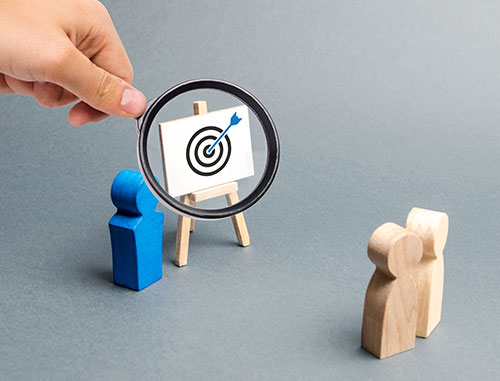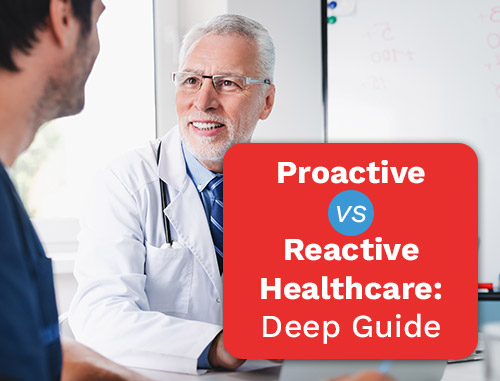Impact of AI Generated Content in Healthcare
Posted on
In the ever-evolving landscape of healthcare, effective communication is key. As technology continues to advance, the role of Artificial Intelligence in transforming healthcare content cannot be overstated. Practice Builders, a leader in healthcare marketing, recognizes the potential of AI content generation to revolutionize how healthcare information is disseminated. In this blog post, we delve into the world of AI content generators, particularly ChatGPT, and explore their implications for healthcare content creation.
Is AI-generated content from ChatGPT dangerous for healthcare?
AI-generated content has raised concerns about accuracy, reliability, and ethical considerations in various industries, including healthcare. However, when it comes to ChatGPT, the risk is minimal. The technology behind ChatGPT has undergone rigorous training, ensuring that the generated content is based on a vast dataset that includes reliable healthcare information. Additionally, the AI content generator is continuously improved and refined to minimize any potential risks associated with misinformation.

How does ChatGPT work?
Understanding how ChatGPT operates is crucial to appreciating its role in healthcare content generation. ChatGPT is built on the GPT-3.5 architecture, a powerful language model created by OpenAI. It utilizes deep learning techniques to analyze and comprehend vast amounts of text data. Through a process known as unsupervised learning, ChatGPT learns to predict and generate coherent and contextually relevant responses based on the input it receives. In the context of healthcare content, ChatGPT can generate text that is not only informative but also tailored to specific medical topics.
GPT-4 advances in AI content writing, excelling in complex problem-solving, enhanced creativity and collaboration, improved safety, and outperforming previous models in benchmarks like the Uniform Bar Exam and Olympiads. To effectively leverage AI for content generation, clear objectives and specific instructions are essential.

What is the difference between ChatGPT and other chatbots?
While the term “chatbot” is often used broadly, it’s essential to distinguish between different types of conversational AI. ChatGPT stands out from traditional chatbots due to its advanced language processing capabilities. Unlike rule-based chatbots that rely on predefined responses, ChatGPT’s responses are generated dynamically, making it more adaptable and capable of handling a wide range of queries. This key difference allows ChatGPT to produce content that closely mimics human-like language, contributing to a more engaging and informative healthcare content experience.
Also, there are a range of purely ethical and information-access-based differences:
It’s conversational:

- ChatGPT, as an AI content generator, is like having a friendly chat with a knowledgeable buddy. It’s designed to make the conversation flow naturally, making information easy to understand and engaging for users.
Admits and learns from mistakes:
- Here’s the cool part: ChatGPT is not perfect, and it’s totally okay with that. If it makes a mistake, it learns from it. This learning process helps it get better over time, ensuring more accurate and reliable responses.
Uses a huge dataset:
- Imagine ChatGPT as a wise old library with a massive collection of books. It has access to a gigantic dataset, allowing it to pull in information from various sources. This ensures that the content it generates is well-informed and comprehensive.
Does not accept requests that are inappropriate:
- ChatGPT is a stickler for keeping things appropriate. It won’t let inappropriate requests slide. This makes verified AI content writing tools a safe and respectful conversation environment, especially important in healthcare where accuracy and sensitivity are paramount.
According to Google, using AI-generated content appropriately isn’t against its policies.
Addressing concerns about the legitimacy of AI-generated content, it’s worth noting that major platforms like Google recognize the value of well-crafted AI content. Google’s policies state that as long as the content meets quality standards and provides value to users, it is acceptable. This endorsement from Google reinforces the idea that, when used responsibly, AI-generated content, including that produced by ChatGPT, can be a valuable asset in healthcare marketing.
What Has to Be Done to Produce High-Quality Content with the Help of ChatGPT?
Creating high-quality healthcare content with the assistance of ChatGPT requires a strategic approach. To maximize the benefits of AI content generation, healthcare professionals and marketers should:
- Define Clear Objectives: Defining clear objectives is crucial for effectively using AI content generators in healthcare. Healthcare professionals should articulate the purpose of content, such as educating patients about medical conditions or promoting new services. This aligns with the intended message and provides a framework for ChatGPT to generate relevant and accurate content, such as patient education materials, blog posts, and social media updates.
- Review and Edit Generated Content: ChatGPT’s capabilities are effective in healthcare content creation, but human review and editing are crucial. Healthcare professionals or experts review content to ensure it complies with industry standards, regulations, and ethical guidelines. Human oversight helps catch inaccuracies and enhances the quality of the content. This collaborative effort between AI and human expertise ensures accurate and effective content that resonates with the intended audience.
- Provide Specific Instructions: ChatGPT’s effectiveness is enhanced when healthcare professionals provide clear instructions. These instructions guide the AI, allowing it to tailor content to meet specific criteria. For example, specifying the tone of content or requesting information format can help ChatGPT produce content that aligns with the healthcare professional’s vision. This collaborative approach allows healthcare practitioners more control over the generated content.
- Stay Informed About Healthcare Trends: Staying informed about healthcare trends is crucial for creating content that resonates with professionals and patients. Healthcare professionals using AI content generators should engage with industry publications, attend conferences, and participate in forums to enhance content accuracy and position them as authoritative sources. By combining AI with up-to-date knowledge, healthcare professionals can create content that reflects current trends and anticipates evolving audience needs.
Conclusion
In conclusion, the integration of AI, particularly ChatGPT, in healthcare content creation is a transformative step toward more efficient and engaging communication. Practice Builders recognizes the potential of AI content generators to revolutionize the way healthcare information is shared.
By understanding the nuances of AI-generated content and leveraging it responsibly, healthcare professionals can boost their marketing efforts, reaching wider audiences with accurate and compelling information. As technology continues to evolve, the partnership between healthcare and AI content generation holds the promise of a brighter, more informative future.

 Reaching The Right Audience Through Target Marketi..
Reaching The Right Audience Through Target Marketi.. Key Elements Affecting Your Website’s Performanc..
Key Elements Affecting Your Website’s Performanc.. Proactive vs. Reactive Healthcare: Deep Guide
Proactive vs. Reactive Healthcare: Deep Guide